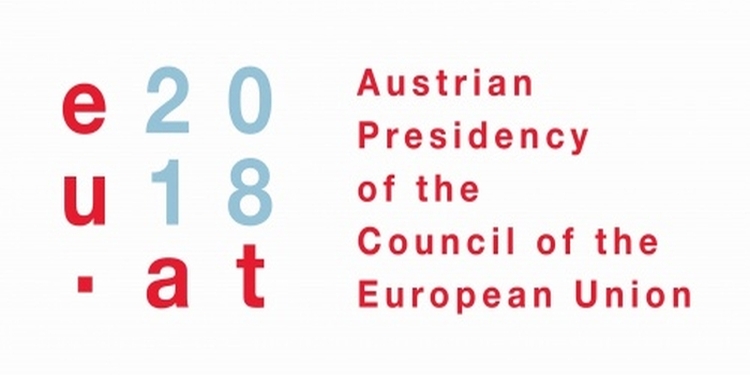Kick off the Austrian Presidency of the EU

The motto for the EU presidency is 'A Europe that protects'.
On 1st July 2018, Austria has assumed the Presidency of the Council of the EU for the third time. The Austrian Presidency will put emphasis on three areas where the EU has a particular protective role: Security and fight against illegal migration; securing prosperity and competitiveness through digitalisation and stability in the neighbourhood – rapprochement of the Western Balkans/South-Eastern Europe to the EU.
As the Parliament’s legislative period is coming to a close with the European Parliament’s elections in May 2019, it will be crucial to prepare the finalisation or reach agreements on as many open legislative proposals as possible. Thus, one of the main tasks of the Austrian Council Presidency will be to reach common positions of the Council on specific proposals.
Subsidiarity is a key element for the Austrian Presidency. The idea is that the scope of action of the EU would be re-defined via a 'Subsidiarity Pact', whereby tasks, which are better handled at Member State level, would be carried out at this level, which they define as taking decisions closer to the citizens.
The Austrian Presidency plans to hold a high-level conference in Bregenz, Austria on 15-16 November 2018, the conclusions of which would serve as substantial input to the European Council meeting in December 2018.
- 1. Security and the fight against illegal migration
Austria will focus on a joint approach in the fight against illegal migration and of securing the EU’s ability to act. At the centre of these efforts are the reform of the Common European Asylum System (the so-called Dublin System) as well as the re-focussing and strengthening of the European Border and Coast Guard Agency FRONTEX, in order to guarantee the efficient protection of the EU’s external borders. This legislative proposal is politically sensitive given that it is linked to the infringement procedures brought against Poland, Hungary and the Czech Republic for non- compliance with relocation obligations.
Moreover, the aim is to work more closely with third countries in order to ensure effective return policies and to provide assistance to those in need of protection before they enter the EU while, on the other hand, preventing those not in need of protection from setting off on the dangerous crossing to Europe. The Heads of State or Government will deal with these issues at their informal summit held in Salzburg on 20 September 2018.
As organised crime in a globalised and converging world is operating in an increasingly
connected way, the Austrian Presidency will advocate efficient cooperation of and information exchange between the security authorities of individual Member States (the ECRIS file and Cross-border access to and use of financial data by law enforcement authorities) as well as the interoperability of the relevant large databases.
- 2. Securing prosperity and competitiveness
As a considerable share of growth in the EU can already be attributed to the digital economy, the presidency aims with an intelligent policy of digital transformation to safeguard the competitiveness and sustainability of the European economy.
Completing the Digital Single Market (the Cybersecurity Act, Copyright directive etc.), modernising public administration on a broad scale and renewing industrial policy will improve framework conditions for digital business models and services.
National public budgets need to be protected from harmful tax competition and tax avoidance, and fair conditions of competition must be guaranteed for all companies. The Austrian Presidency aims at continuing the EU’s work on the taxation of the digital economy in order to ensure that profits are taxed in the country in which they are generated, but this will be a tough file.
A number of ongoing complex and challenging dossiers will also feature prominently during the second half of 2018, such as Brexit, the interinstitutional negotiations of a new Multiannual Financial Framework (MFF) 2021-2027 and the reform of the EU.
On the social side, the coordination of social security systems aiming to update EU rules on
coordinating social security provisions of EU citizens, they aim to have an agreement under by the end of 2018.
- 3. Stability in the European neighbourhood – EU perspective of the Western Balkans/ South Eastern Europe
During its Presidency, Austria will focus on promoting strong relationships between the EU and its neighbours and the Western Balkan/South Eastern European countries take centre stage. The Austrian Presidency will hence advocate for developing a concrete EU perspective for these states based on clear criteria relating to their individual performance and work on achieving measurable progress.
Best wishes to Austria!
By accepting you will be accessing a service provided by a third-party external to https://www.schumanassociates.com/
